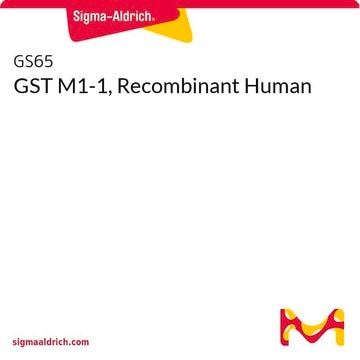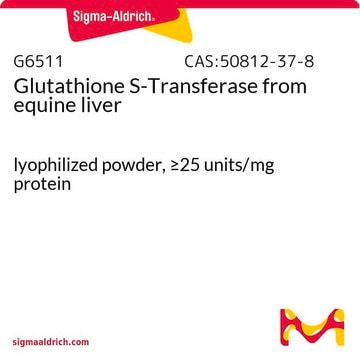GS90
GST T1-1, Recombinant Human
Sinónimos:
glutathione S-transferase theta 1
Iniciar sesiónpara Ver la Fijación de precios por contrato y de la organización
About This Item
UNSPSC Code:
12352200
NACRES:
NA.26
Productos recomendados
biological source
human
Quality Level
recombinant
expressed in E. coli
assay
95% (SDS-PAGE)
form
frozen liquid
specific activity
8.8 units/mg protein
mol wt
25 kDa
concentration
1.95 mg/mL
storage temp.
−70°C
Gene Information
human ... GSTT1(2952)
General description
Glutathione S-transferase theta 1 (GSTT1) and GSTT2/GSTT2B share 55% amino acid sequence identity and may play a role in human carcinogenesis. The GSTT1 gene is haplotype-specific and is absent from 38% of the population. Alternative splicing of this gene results in multiple transcript variants.GSTT1 is an enzyme that in humans is encoded by the GSTT1 gene. The GSTT1 gene contains five exons and four introns and spans 8092bp on genomic DNA. It is mapped to human chromosome 22q11.23. This gene codes for a 240 amino acids, which is mainly expressed in human liver. Based on their biochemical, immunologic, and structural properties, cytosolic and membrane-bound forms of glutathione S-transferase are encoded by two distinct supergene families. At present, eight distinct classes of the soluble cytoplasmic mammalian glutathione S-transferases have been identified: α, κ, μ, ω, π, σ, θ and ζ.
as assayed by the spectrophotometric determination of NADPH oxidation coupled to the glutathione peroxidase activity of GST T1-1 on cumene hydroperoxide (1.5 mM) in the presence of reduced glutathione (1 mM) in 100 mM NaPO4 (pH 7.0) at room temperature.
Biochem/physiol Actions
Glutathione S-transferase theta 1 (GSTT1) is an enzyme that in humans is encoded by the GSTT1 gene. Glutathione S-transferases (GSTs) are a family of enzymes that play an important role in detoxification by catalyzing the conjugation of many hydrophobic and electrophilic compounds with reduced glutathione. Mutation in the gene might lead to the development of lung, head and neck cancer. The GSTs are thought to function in xenobiotic metabolism and play a role in susceptibility to cancer, and other diseases.
Storage and Stability
The enzyme should be used by the end-user customer within 1 year of receipt.
Storage Class
10 - Combustible liquids
wgk_germany
WGK 1
flash_point_f
Not applicable
flash_point_c
Not applicable
Certificados de análisis (COA)
Busque Certificados de análisis (COA) introduciendo el número de lote del producto. Los números de lote se encuentran en la etiqueta del producto después de las palabras «Lot» o «Batch»
¿Ya tiene este producto?
Encuentre la documentación para los productos que ha comprado recientemente en la Biblioteca de documentos.
GSTT1 null genotype contributes to lung cancer risk in asian populations: a meta-analysis of 23 studies
Yang, X, et al.
PLoS ONE, 8 (2013)
Association of GSTM1 and GSTT1 gene deletions with risk of head and neck cancer in Pakistan: a case control study
Nosheen, M, et al.
Asian Pacific Journal of Cancer Prevention, 11, 881-885 (2010)
Bacterial glutathione S-transferases: what are they good for?
Vuilleumier, S, et al.
Journal of Bacteriology, 179, 1431-1431 (1997)
Wen Sun et al.
BMC ophthalmology, 15, 84-84 (2015-07-26)
Glutathione S transferase (GST) polymorphisms have been considered as risk factors for age-related cataracts, but the results remain controversial. In this study, we have performed a meta-analysis to evaluate the association between polymorphisms of GSTM1 and GSTT1 and cataract risk.
Alfredo Santovito et al.
Journal of biochemical and molecular toxicology, 29(5), 234-239 (2015-02-04)
Occupational exposure to anaesthetic gases is one of the major hazards to healthcare personnel. We evaluated the cytogenetic effects of chronic exposure to low concentrations of anaesthetic gases in operating theatres. The study included 21 anesthetists and 21 control subjects
Nuestro equipo de científicos tiene experiencia en todas las áreas de investigación: Ciencias de la vida, Ciencia de los materiales, Síntesis química, Cromatografía, Analítica y muchas otras.
Póngase en contacto con el Servicio técnico



![[1,1′-Bis(diphenylphosphino)ferrocene]dichloropalladium(II)](/deepweb/assets/sigmaaldrich/product/structures/130/734/8846aa26-1858-458a-998d-8c306c13bf0f/640/8846aa26-1858-458a-998d-8c306c13bf0f.png)




